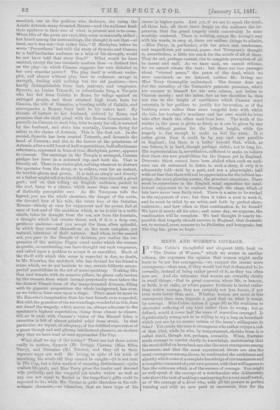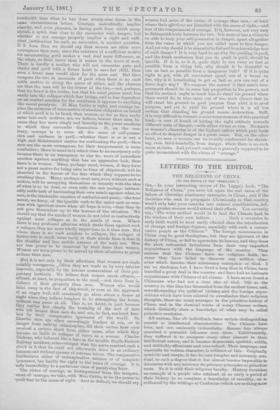MEN'S AND WOMEN'S COURAGE.
TN Miss Cobbe's thoughtful and eloquent little book on
" The Duties of Women," which we review in another column, she expresses the opinion that women might easily learn to be not less courageous,—we suspect she means more courageons,—than men, if they would but feel it shameful to be cowardly, instead of being rather proud of it, as they too often now are. And she intimates that women are cowardly chiefly in small things,—that in great concerns, where life, or honour, or faith, is at stake, or where passive fortitude is tested. rather than active courage, they are certainly not less heroic, if not even more heroic than men. Whether women are more or less courageous than men, depends a good deal on what is meant by courage. Miss Cobbe defines it (page 20) as the readiness to encounter suffering of any kind rather than do wrong; but so defined, would it cover half the cases of masculine courage? Is it particularly wrong not to be willing to try a leap on horseback which you are by no means certain of the horse's willingness to take ? Yet surely the man is courageous who rather enjoys a risk of that kind, while he who, by temperament, shrinks from it is called timid, though not, perhaps, cowardly. When Socrates made courage to consist chiefly in knowledge, maintaining that the most skilful on horseback are also the most courageous among horsemen, and that the most experienced divers are also the most courageous among divers, he confounded the confidence and alacrity which come of a complete knowledge of circumstances and a complete command of your own powers, with that willingness to face the unknown which is of the essence of courage. You might as well speak of the courage of a watchmaker who deliberately sets about the task of making a mainspring for a very small watch, as of the courage of a diver who, with all his powers in perfect training and with no new peril to encounter, does for the
hundredth time what he lies clone ninety-nine times in the same circumstances before. Courage, undoubtedly, implies alacrity, and even pleasure, in facing peril from which many shrink, a spirit that rises to the encounter with danger; but whether or not courage properly implies a right and suffi- cient jnetification for such an encounter, is another question.
If it does, then we should say that women are often more courageous than men, since the existence of a sufficient motive
for encountering peril makes a vast deal more difference, on
the whole, to their nerve than it makes to the nerve of men. There is hardly a mother who will not encounter pain and shame and peril with a firmer heart to save her child, than even a brave man would show for the same end. But then compare the two in moments of peril when there is :no such noble motive to string the nerve of either, and the chances are that the man will be the braver of the two,—not, perhaps, that his heart is the bolder, but that his mind passes much loss easily into the collapse which fear brings, and is less dependent an• an exalted emotion for the resistance it opposes to anything like moral paralysis. If Miss Cobbe is right, and courage im- plies the existence of some motive of absolute obligation on behalf of which peril is to be faced, then women, so far as they really enter into such motives, are, we believe, braver than men, be- cause they live more singly and heartily in the purer emotions to which they surrender themselves. If, on the con- trary, courage is to cover all the cases of self-posses- sion and coolness in peril,—whether there is or is not a high and disinterested motive for confronting the peril,—thou men are the more courageous, for their temperament is more combative ; there is more in it which rises to an emergency only because there is an emergency to rise to ; more of immediate reaction against anything that has an aggressive look, than there is in women. Many, perhaps most, women, if they have not a great motive for being calm in time of shipwreck, will be absorbed in the horror of the fate which they suppose to be awaiting them. Many, perhaps most men, even without such a motive, will be occupying themselves so intently with the idea of what is to be done, or even with the not perhaps intrinsi- cally noble task of barricading their own minds against what, to men, is the intolerable emotion of confusion and panic,—the true secret, we fancy, of the ignoble rush to the spirit cask so com- mon with ignorant crews when all hope is over,—that they do not give themselves up to the horrors of the situation. 'We should say that the minds of women do not rebel as instinctively against mere collapse as do the minds of men. Where there is any profound affection which steels them against such a collapse, they are more wholly impervious to it than men. Bat where there is no such antidote to collapse, the collapse of horror sets in much more easily in their minds than it does in the -sturdier and less mobile „natures of the male sex. Men are less prone to be unnerved by their fears than women. Women are more prone to be nerved by their affections to great actions than men.
But it is not only by their affections that women are made notably courageous. „ Often they are made so by very inferior interests, especially by the intense conservatism of their pro- prietary instincts. We believe that women much oftener,— oftener, at least, in proportion to the need,—risk their lives in defence of their property than men. Women who would faint away in the face of shipwreck, or even at the approach of an augry bull, will constantly go alone about a louse at night when they believe burglars to be attempting the house, without any panic at all. This is, no doubt, in part because they realise less clearly the brutality of the sort of men who rob houses than men do, and are, in fact, rendered fear- less by their comparative ignorance of the world. So likewise men are often exceedingly fearless at sea, or in danger from railway catastrophes, till their nerves have once received a serious shock from either cause, after which they become as liable to collapse of nerve as a woman. Charles Dickens, who behaved like a hero in the terrible South-Eastern Railway accident, acknowledged that his nerve received such a shock in it that he could not afterwards drive in an ordinary hansom-cab without spasms of extreme terror. The comparative fearlessness either of unimaginative natures or of complete ignorance, has hardly the right to the name of courage. It is only insensibility to a particular class of paralysing fears.
The virtue of courage, as distinguished from the tempera- ment of courage, we take, with Miss Cabe, to be the power to quell fear in the cause of right. And so defined, we should say
women had more of the virtue of courage than men,—at least where their affections are identified with the cause of right,—and less of the temperament of courage. It is, however, not very easy to distinguish truly between the two. It is more or less a virtue to be able to keep your self-possession in danger, apart altogether from the cause in which you are called upon to face danger. And yet why should it be shameful to feel and to acknowledge fear of such danger P It is very hard to see why the quailing in peril, and the frank confession that you do quail in peril, should be ignoble. If it is, as it is, quite right to run away as fast as possible from a rising tide, why should it be shameful to run as fast as possible from a dangerous bull ? If it is quite right to get, with all convenient speed, out of a house on fire, why is it humiliating to get as fast as you can out of a fierce dog's way P We suppose the answer is that man's tem- perament should be in sonic fair proportion to his powers, and that his instinct ought to teach him to stand his ground where there would be, in nine cases out of ten, more chance that he will stand his ground to good purpose than yield it to good purpose, and yet to yield his ground where it is all but certain that standing his ground means destruction. Still, it is very difficult to connect a mere temperament of this practical kind,--a sort of knack of hitting the right attitude towards different sorts of danger,—with either virtue or vice. No man's or woman's character is of the highest calibre which puts forth no effort to despise danger in a great cause. But, on the other hand, no man or woman can be morally condemned for shrink- ing, eveu faint-heartedly, from danger, whore there is no such cause at stake. And yet such conduct is generally supposed to be quite inconsistent with the virtue of "courage."



































 Previous page
Previous page